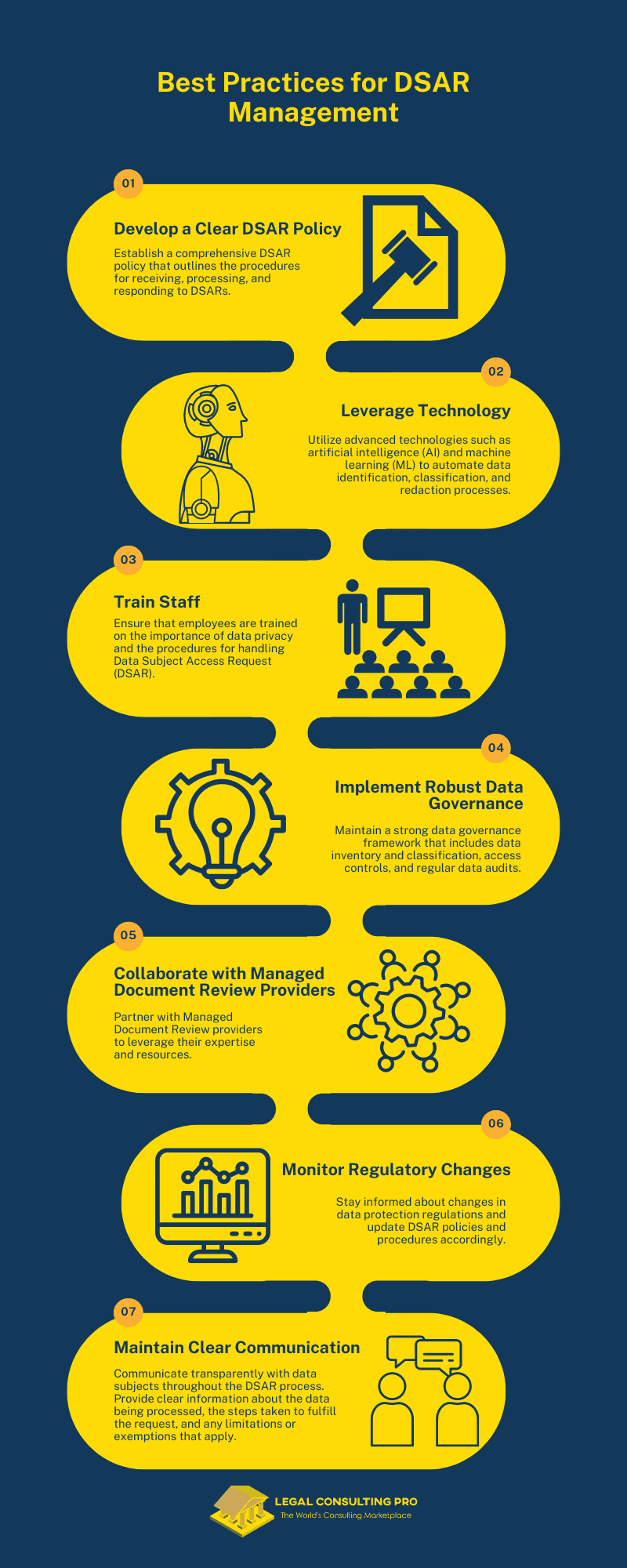In the digital age, data privacy has become a paramount concern for individuals and organizations alike. With the advent of comprehensive data protection regulations such as the General Data Protection Regulation (GDPR) and the California Consumer Privacy Act (CCPA), the right of individuals to access their personal data has been enshrined in law. This right is typically exercised through Data Subject Access Requests (DSAR). While fulfilling a Data Subject Access Request (DSAR) promotes transparency and empowers individuals, it also presents significant challenges, particularly in balancing transparency with data privacy. This article delves into the complexities of managing DSARs and the critical role of Managed Document Review in addressing these challenges.
Understanding Data Subject Access Requests (DSAR)
A Data Subject Access Request (DSAR) is a request made by an individual to an organization, asking for access to their personal data. Under regulations like the GDPR and CCPA, individuals have the right to know what personal data is being collected, how it is being used, and with whom it is being shared. Organizations are obliged to respond to Data Subject Access Request (DSAR) within a specified timeframe, typically one month, providing a copy of the requested data and supplementary information about its processing.
Challenges in Fulfilling Data Subject Access Request (DSAR)
- Volume and Complexity of Data: Organizations often manage vast amounts of data, stored across multiple systems and formats. Identifying and retrieving all relevant personal data in response to a Data Subject Access Request (DSAR) can be a daunting task, especially when data is unstructured or spread across different departments.
- Ensuring Data Accuracy and Completeness: Providing accurate and complete information is crucial when fulfilling DSARs. Inaccurate or incomplete responses can lead to legal repercussions and damage to the organization’s reputation.
- Balancing Transparency and Privacy: One of the most significant challenges is ensuring that the fulfillment of a Data Subject Access Request (DSAR) does not compromise the privacy of other individuals. This requires a careful review and redaction of third-party information, which can be resource-intensive.
- Regulatory Compliance: Organizations must navigate a complex web of data protection regulations, each with its own requirements for Data Subject Access Request (DSAR). Ensuring compliance with these regulations while managing DSARs is critical to avoid legal penalties.
- Resource Allocation: Responding to Data Subject Access Request (DSAR) can be resource-intensive, requiring significant time and effort from legal and compliance teams. Smaller organizations, in particular, may struggle with the resource demands of managing DSARs effectively.
The Role of Managed Document Review
Managed Document Review is an essential component in addressing the challenges associated with Data Subject Access Requests (DSAR). It involves the outsourcing of document review tasks to specialized service providers who have the expertise, technology, and resources to manage large-scale data review projects. Here’s how Managed Document Review can help:
- Efficient Data Identification and Collection: Managed Document Review providers use advanced technologies and methodologies to efficiently identify and collect relevant data across multiple systems. This reduces the time and effort required to locate personal data in response to a DSAR.
- Accurate Data Review and Redaction: With their expertise in data privacy and protection, Managed Document Review providers ensure that data is accurately reviewed and that sensitive third-party information is appropriately redacted. This helps in balancing transparency with the need to protect the privacy of other individuals.
- Regulatory Compliance: Managed Document Review providers are well-versed in data protection regulations and ensure that DSAR responses are compliant with applicable laws. This includes understanding the nuances of different regulations and implementing best practices to meet legal requirements.
- Scalability and Flexibility: Managed Document Review services can scale to meet the demands of organizations of all sizes. Whether dealing with a single DSAR or managing multiple requests, these services provide the flexibility needed to handle varying workloads efficiently.
- Cost-Effectiveness: By outsourcing DSAR management to Managed Document Review providers, organizations can reduce the internal resource burden and associated costs. This allows legal and compliance teams to focus on core activities while ensuring that DSARs are handled effectively.
Best Practices for DSAR Management
To effectively balance transparency and data privacy in the fulfillment of Data Subject Access Request (DSAR), organizations should adopt the following best practices:
- Develop a Clear DSAR Policy: Establish a comprehensive DSAR policy that outlines the procedures for receiving, processing, and responding to DSARs. This policy should include guidelines for data identification, review, redaction, and communication with data subjects.
- Leverage Technology: Utilize advanced technologies such as artificial intelligence (AI) and machine learning (ML) to automate data identification, classification, and redaction processes. This can significantly enhance the efficiency and accuracy of DSAR management.
- Train Staff: Ensure that employees are trained on the importance of data privacy and the procedures for handling Data Subject Access Requests (DSAR). This includes understanding the legal requirements, recognizing DSARs, and knowing how to respond appropriately.
- Implement Robust Data Governance: Maintain a strong data governance framework that includes data inventory and classification, access controls, and regular data audits. This helps in quickly locating and retrieving personal data when responding to Data Subject Access Request (DSAR).
- Collaborate with Managed Document Review Providers: Partner with Managed Document Review Providers to leverage their expertise and resources. This collaboration can streamline the DSAR process, ensure compliance, and protect sensitive information effectively.
- Monitor Regulatory Changes: Stay informed about changes in data protection regulations and update DSAR policies and procedures accordingly. This proactive approach ensures ongoing compliance and reduces the risk of legal issues.
- Maintain Clear Communication: Communicate transparently with data subjects throughout the DSAR process. Provide clear information about the data being processed, the steps taken to fulfill the request, and any limitations or exemptions that apply.

Case Studies: Success Stories in DSAR Management
Case Study 1: Global Tech Company
A global tech company faced a surge in DSARs following the implementation of the GDPR. The company struggled to manage the volume of requests due to its vast and complex data landscape. By partnering with a Managed Document Review provider, the company was able to streamline its DSAR process. The provider used advanced data identification and redaction technologies to quickly locate and review relevant data. As a result, the company achieved compliance with GDPR requirements, reduced response times, and maintained the privacy of third-party information.
Case Study 2: Financial Services Firm
A financial services firm needed to ensure compliance with CCPA while managing Data Subject Access Requests (DSAR) from clients across the United States. The firm implemented a comprehensive DSAR policy and collaborated with a Managed Document Review provider. The provider’s expertise in data protection regulations and efficient review processes enabled the firm to handle DSARs effectively. The firm not only met regulatory requirements but also improved customer trust and satisfaction through transparent communication and timely responses.
Future Trends in DSAR Management
The landscape of DSAR management continues to evolve, driven by advancements in technology and changes in regulatory frameworks. Here are some future trends to watch:
- Increased Automation: Automation will play an increasingly significant role in DSAR management. AI and ML technologies will continue to improve, enabling more efficient and accurate data identification, classification, and redaction.
- Enhanced Data Privacy Tools: New tools and technologies will emerge to help organizations manage data privacy more effectively. These tools will offer advanced features for data mapping, risk assessment, and compliance monitoring.
- Global Regulatory Alignment: As data protection regulations evolve, there may be greater alignment and harmonization across jurisdictions. This could simplify compliance for organizations operating in multiple regions and reduce the complexity of managing Data Subject Access Requests (DSAR).
- Focus on User Experience: Organizations will place a greater emphasis on improving the user experience for data subjects. This includes providing clear and user-friendly interfaces for submitting DSARs, as well as transparent communication throughout the process.
- Integration with Data Management Systems: DSAR management will become more integrated with broader data management systems. This integration will facilitate seamless data retrieval, review, and reporting, enhancing overall efficiency and compliance.
Conclusion
Balancing transparency and data privacy in the fulfillment of Data Subject Access Requests (DSAR) is a complex and challenging task. Organizations must navigate the intricacies of data protection regulations, manage vast amounts of data, and ensure that sensitive information is protected. Managed Document Review plays a crucial role in addressing these challenges, offering expertise, technology, and resources to manage Data Subject Access Request (DSAR) effectively.
By adopting best practices for DSAR management, leveraging advanced technologies, and collaborating with Managed Document Review providers, organizations can achieve a balance between transparency and privacy. This not only ensures compliance with legal requirements but also enhances trust and satisfaction among data subjects. As the landscape of data privacy continues to evolve, staying informed about regulatory changes and emerging trends will be essential for successful DSAR management in the digital age.
Similar blogs:
5 Key Factors to Consider When Outsourcing Managed Document Review for Legal Matters
What is Legal Document Review and Why You Should Hire an Expert?







































